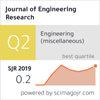Identifying barriers and benefits of shared e-scooters in promoting sustainability in Kuwait using Delphi and Force Field Analysis Methods
IF 2.2
4区 工程技术
Q3 ENGINEERING, MULTIDISCIPLINARY
引用次数: 0
Abstract
People are wasting time during their way to their destination due to traffic jam. Shared electronic scooter is ana alternative transport mode that saves time. This mode of transportation widely spread after COVID-19 pandemic. This research investigates the main opportunities and barriers of adopting this technology in Kuwait from three sides which are social, environmental, economic, and safety aspects taking into consideration the travel behavior and urban infrastructure sides. Experts’ opinions were collected from two rounds of the Delphi questionnaire. The collected data was analyzed using Force Field Analysis Method in order to get a precises prediction of the most significant facilitators and barriers after the period of COVID-19 to figure out the importance of the sustainability of the e-scooters. According to the urban infrastructure side, the e-scooters adoption was favorable from all aspects except the economic aspect. On the other hand, travel behavior was challenging, it was unfavorable form environmental and safety aspects. It’s recommended to regulate more laws that ensure all road users’ safety.
利用德尔菲法和力场分析法确定共享电动滑板车在促进科威特可持续发展方面的障碍和益处
由于交通堵塞,人们在去目的地的路上浪费时间。共享电动滑板车是一种节省时间的替代交通方式。这种交通方式在COVID-19大流行后广泛传播。本研究从社会、环境、经济和安全三个方面考察了在科威特采用这项技术的主要机会和障碍,同时考虑到旅行行为和城市基础设施方面。通过两轮德尔菲问卷收集专家意见。利用力场分析法对收集到的数据进行分析,精确预测新冠疫情后最重要的促进因素和障碍,从而得出电动滑板车可持续性的重要性。从城市基础设施方面来看,除了经济方面,电动滑板车的采用在各个方面都是有利的。另一方面,旅行行为具有挑战性,从环境和安全方面来说是不利的。建议制定更多的法律来确保所有道路使用者的安全。
本文章由计算机程序翻译,如有差异,请以英文原文为准。
求助全文
约1分钟内获得全文
求助全文
来源期刊

Journal of Engineering Research
ENGINEERING, MULTIDISCIPLINARY-
CiteScore
1.60
自引率
10.00%
发文量
181
审稿时长
20 weeks
期刊介绍:
Journal of Engineering Research (JER) is a international, peer reviewed journal which publishes full length original research papers, reviews, case studies related to all areas of Engineering such as: Civil, Mechanical, Industrial, Electrical, Computer, Chemical, Petroleum, Aerospace, Architectural, Biomedical, Coastal, Environmental, Marine & Ocean, Metallurgical & Materials, software, Surveying, Systems and Manufacturing Engineering. In particular, JER focuses on innovative approaches and methods that contribute to solving the environmental and manufacturing problems, which exist primarily in the Arabian Gulf region and the Middle East countries. Kuwait University used to publish the Journal "Kuwait Journal of Science and Engineering" (ISSN: 1024-8684), which included Science and Engineering articles since 1974. In 2011 the decision was taken to split KJSE into two independent Journals - "Journal of Engineering Research "(JER) and "Kuwait Journal of Science" (KJS).
 求助内容:
求助内容: 应助结果提醒方式:
应助结果提醒方式:


